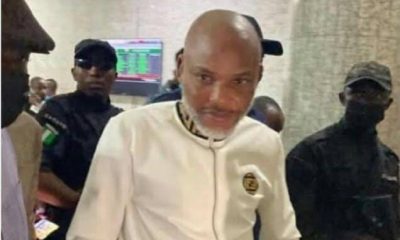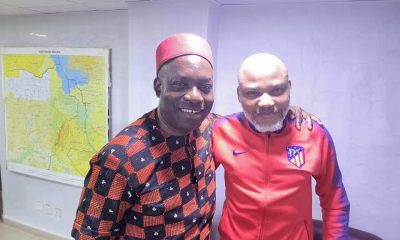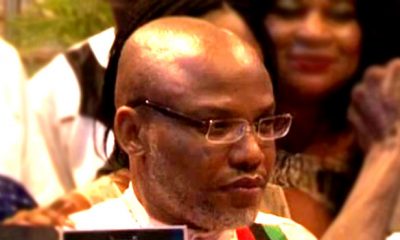Opinion
Nnamdi Kanu, Biafra And The Battle Within

By Collins Opurozor
The nascent Biafran agitations have ostensibly come down to a fierce battle no longer so much for the restoration of the sovereignty of Biafra than for the protection of some interests personal to the agitators. Until recently, Nnamdi Kanu had gone almost unchallenged as the rabble rouser-in-chief of the cause until Ralph Uwazuruike, who of course was the inspirer of the neo-Biafran cause, staged a comeback by registering Biafra with the Unrepresented Nations and Peoples Organization (UNPO).
In addition, Tony Nnadi, who had been comfortably obscure in his Lower Niger Congress, has at last chosen to shatter the barriers of obscurity to engage Nnamdi Kanu in a dirty fight to assert the legitimacy of his approach and the feasibility of his strategy to achieve self-determination for Biafra or what he chooses to describe as the Lower Niger.
Asari Dokubo, ex militant and war lord, who until recently had been an ally to Kanu, has also drawn a battle line. For Dokubo, Nnamdi Kanu is not by an inch more than an Igbo supremacist whose innermost persuasion is to subsume the other clearly distinct linguistic groupings in the defunct Eastern Nigeria into the Igbo under the guise of struggling for Biafra’s restoration.
Uche Mefor, Deputy Leader of IPOB, has recently been writing and speaking up against Nnamdi Kanu, stressing that his principal has derailed from the vaunted mission of restoring Biafra and has delved into issues of religion which negate the principles of equity, fairness, egalitarianism and fundamental freedoms, a negation that has also defiled Nigeria and justifies the necessity for Biafra. In short, Mefor, a devout Catholic, feels that he can no longer keep quiet while Nnamdi Kanu, an adherent of Judaism, castigates Christianity and describes Christian clerics, without exception, as fraudulent and their followers as foolish. “No religion is perfect. If you therefore make it a duty to advertise the weaknesses of my religion, how would you feel if I begin to advertise your weaknesses? You are not perfect either,” Mefor told Kanu in a video.
It is quite interesting to note that, at least presently, none of these agitators is in any form of struggle with Nigeria for the restoration, liberation or actualization of Biafra. Their swords have been turned against one another at a time that has been unarguably most perilous for their people.
One would need to be convinced on how the unending description of Mohammadu Buhari as Jubril al-Sudani will help the actualization of Biafra. One also needs to be clarified on the connection between the personal life of Aisha Buhari and the quest for Biafra. Similarly, it would be important to educate an interested audience on the relationship between the insults on Yoruba people and the feasibility of Biafra, and it would be worthwhile to enlighten Igbo people on the relationship between the denigration of their revered institutions, disrespect for the elderly, unabashed insolence towards every leader of note and the restoration of Biafra. To be sure, the loudest agitation for Biafra led by the IPOB is not in any way targeted at anything else beyond pecuniary gains.
As events unfold, it is becoming safer for one to conclude that the realization of Biafra is not on the agenda of these agitators. Being fixated with the material gains which the struggle offers, they have lost sight of the ultimate end of the struggle, turned against one another, and have lent themselves to egoism, arrogance and haughtiness.
In retrospect, can it be said that Nnamdi Kanu was right to have concluded that the disruption of the Anambra governorship election was the only way to achieve Biafra or was Asari Dokubo right when he opposed it and insisted that the disruption would entail handing over Anambra to the “enemy” which would not help the actualization of Biafra? Does Asari’s opinion on this issue qualify him as a saboteur as he has always been described by Nnandi Kanu?
Again, was Tony Nnadi right when he drew the attention of Nnamdi Kanu to the fact that there was need for a generally accepted and undisputed map of the imaginary republic of Biafra as the first condition for liberation and was Nnamdi Kanu right to have insisted that all the communities where women wear two pieces of wrapper in Nigeria belong to Biafra? Third, between Nnamdi Kanu’s belief in a violent approach and Ralph Uwazuruike’s non-violence which is more likely to achieve the desired result? Does Uwazuruike qualify to be called a traitor for believing in non-violence?
If violence is the pathway to Biafra, which capacity for violence has Nnamdi Kanu built over the years? Between the relentless onslaught of Tony Nnadi on the 1999 Constitution which aim is to delegitimize the document and throw Nigeria into a constitutional crisis so as to renegotiate the existence of the country by way of a referendum and Nnamdi Kanu’s unbridled verbal attacks on other ethnic nationalities in Nigeria which is likely going to lead to the restoration of Biafra?
If really 95% of Igbo people are Christians, what does the future hold for them in Nnamdi Kanu’s Judaic republic of Biafra where Christianity will be tagged fraudulent and criminalized?
It’s important to end this part by pointing out that in view of the republican nature of the nationalities that make up the territory delineated as Biafra, any movement that is not cognizant of such will likely come to naught. The personality cults that have overtime been created by those who seek to liberate Biafra will in the end worsen the woes of the people and leave them with shattered aspirations, even as they hope endlessly for Biafra.









